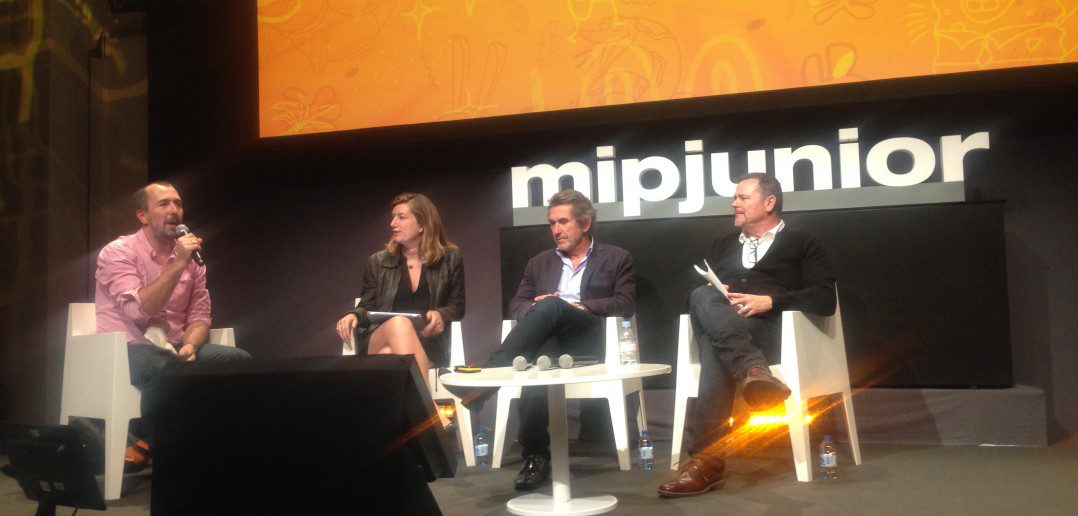Left to right: moderator Jesse Cleverly, creative director, Wildseed Studios; Tiphaine De Raguenel, director-children and youth activities, France Télévisions; Jean-Julien Baronnet, CEO, Ubisoft Motion Pictures; and Russell Hicks, president-content development and production, Nickelodeon.
This special session covered how three big brands — Nickelodeon, France Télévisions and Ubisoft — transformed a video game called « Rabbids » into a multi-platform hit.
Nickelodeon was the first-ever kid’s network that, today, is a multiplatform brand. Its 15 websites enjoy 40 million monthly visits, and it’s launched over 60 gaming apps — seven of which are top-ten titles.
« The first step in making great content for kids is to know who they really are, » said Hicks. At Nickelodeon, research takes place daily — « funny is everything ». 74% of kids describe themselves as funny, ranking laughter more important than family vacations or family meals. They also love technology, and expect new, original content everywhere they go.
The oldest members of this generation are only nine years old.
With that in mind, Nickelodeon produces content for every platform, and facilitates kids’ transition from viewers to content creators. Its vaults are padded with people who’ve participated in its university outreach, artist and writers programmes, and mentorships.
A few examples include original web series Welcome to the Wayne, and The Loud House, a short-form series that’s appeared on TV, websites and the Nick app after it was chosen in a pitch session for Nickelodeon’s Animated Shorts Programme.
But preschool is the holy grail.
In the US alone there are 16 million kids aged 2-5. A single preschool hit can generate millions — and with that in mind, Nickelodeon’s made over 165 hours of preschool content. « Our bandwidth is virtually unlimited — we’re actively looking for the next big hit for this audience, » said Hicks.
Which brings us to Rabbids Invasion, created alongside game software firm Ubisoft in France. The Rabbids, which began life as an explosively popular video game, is now a Nickelodeon series that relies more on physical comedy than scripted words. « They’re random and have their own language that’s somehow instantly intelligible, » Hicks gushed.
« We started with the Rabbids, but without France Télévisions and Nickelodeon’s commitment we wouldn’t have made it, » said Baronnet of Ubisoft. « They were totally crazy to trust us. It was our first production. »
According to Hicks, « We were looking for a non-verbal comedy, » and the Rabbids worked because Ubisoft created characters who could scale. « It was, ‘This is the characters, how they work, why they’re there, what they liked' » — there were rules in their universe, said Hicks. « We didn’t look at it as a video game. »
« A lot of game editors used to try making TV series and features, » Baronnet mused. « It’s a dangerous idea. Most franchises cannot be adapted. For us the Rabbids could go global and be adapted, » thanks to its capacity to be easily understood in any language.
« The Rabbids is not only a script with humour; it’s also behaviour, » said Baronnet. « The visual narrative was as important as the writing narrative. »
Of course, there were struggles. « When you’re dealing with the DNA of brands, gamers go crazy, » Baronnet said. « It’s the same for Assassin’s Creed as it is for Rabbids. People said there is no way you can do Rabbids for kids; the brand should be for young adults. The challenge was to convince people internally that it could work, and also convince France Télé & Nickelodeon. We had to push the boundaries. »
De Raguenel of France Télévisions, which airs 5000 hours of programming yearly on two networks and digital platforms, chimed in on the importance of protecting DNA, but also on how crucial it was to work with developers whose culture France Télévisions understood.
« It was important for us to work with Ubisoft because they’re local game producers. And we are crazy about the Rabbids, » she said. « Our main challenge in writing it was to keep this silly humour the Rabbids have and keep them acting like three-year-old kids: they discover everything, know nothing, always want to have fun. »
While shared culture made work flow smoothly for France Télé, Nickelodeon had a slightly harder time with it. « There were things that wouldn’t work in America, » Hicks admitted. « We have sensitivities about guns. In one episode, someone wheels in some guns, and we were like ‘No, that won’t work’. »
But on the other side of the coin, Ubisoft « brought some visual gags I have never seen in my life! You can’t not laugh. »
And going cross-cultural yielded great benefits. « We totally changed our way to work, » said Baronnet. « French people have a huge ego, and French writers do too. Inspired by the US, we created a taskforce of writers, directors and storyboarders working together, at the pitch level, from the very beginning. From the pitch to final delivery, they challenged each other. »
Today Ubisoft’s Rabbids team includes four writers, four directors and four storyboarders who have been working on the series since the beginning.
« The great thing is Ubisoft wanted to partner with us, and came early into the process, » Hicks added. « We could influence them from the very beginning. We like to act like shepherds to the flock; we don’t want our sheep to fall off the edge. We guide them with what we know works for audiences. »
Baronnet corroborated that. « Everyone thinks that working for brands like France Télé or Nickelodeon is difficult. It’s a mistake, » he said. « If they weren’t there, the show would be 90% less good. Early on, my team was freaking out, they worried they’d impose themselves. This is stupid. They knew what to do to make it a success. We learned a lot. »
« Great characters can transcend all media, » Hicks said. « The main thing is to look for characters like that. Today’s kids don’t just watch TV; they watch everything. They have all these devices, and each one gives them a different experience. »
He added, « Look for the potential behind everything. Never look at something like ‘I’m just developing TV’. Develop IPs that transcend media. »
De Raguenel admonished listeners to « pay attention. Be open-minded with your partner. And know the DNA » of the brand.
« When you adapt, you betray a little bit, » she concluded. « You have to keep the character strong, and you need a partner » who respects that.
We wrapped the session with a special screening of the first two minutes of Rabbids Season 2. In the episode, a few Rabbids try their hand at reaching the moon, but fall comically short. The laughter in the auditorium was a particularly good omen!




